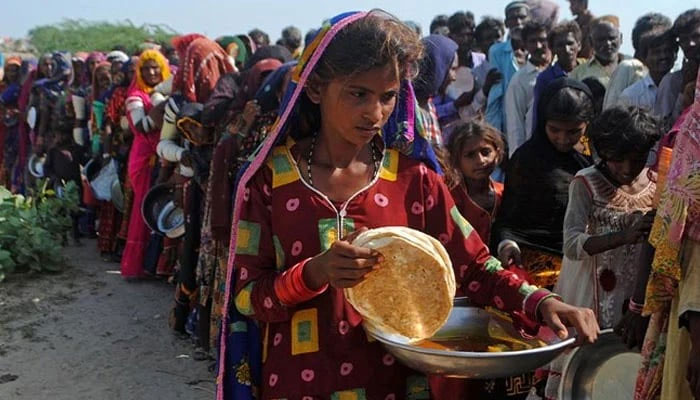Food insecurity
Climate change became a buzzword in 2022 when floods left one-third of country underwater
Why is the plight of millions of Pakistanis invisible? In a recently concluded two-day symposium on ‘Climate Change, Agriculture, Human Nutrition, and Development in Pakistan’ (Nov 29-30), hosted by the Institute for Global Health and Development (IGHD) at the Aga Khan University (AKU) in collaboration with the Sustainable Development Solutions Network Pakistan (SDSN), experts painted a bleak picture for Pakistan if authorities continue to fail to take any meaningful step to mitigate the effects of climate change. These alarm bells have been raised intermittently, but unfortunately there has not been any constructive work in this regard. Prolonged heatwaves leading to crop damage; droughts; and apocalyptic floods have brought uncountable challenges for a majority of people, but since most of them are from the country’s rural areas, their suffering is rarely highlighted.
Climate change became a buzzword in 2022 when floods left one-third of the country underwater. But it quickly lost its relevance as most people shifted their focus to other issues. What needs to be emphasised is that climate effects are not limited to large-scale destruction of fertile lands or loss of cattle. Such events also push people down the poverty line. For example, hundreds of thousands of people who have been internally displaced are living hand-to-mouth in urban cities, with no major skill to earn a decent income, and yet we see the government not much interested in working for their rehabilitation. We have children going to sleep on an empty stomach. We have malnourished pregnant women who gave birth to underweight babies who require urgent medical care. All the while, we have leaders in Pakistan who keep bragging about the country’s young population, but do next to nothing about the health challenges that these people face. In most major cities, people line up in front of organisations to collect food parcels – most survive on one meal per day. The rising cost of food items and stagnant salaries have made living miserable for most people.
A healthy nation is key to a country’s success, and yet we have allowed prices of food items to be determined by market players. If we are to improve food security in our country, we have to analyse where we lack and what we could do to improve it. What we need is a home-grown solution to our problems. Regardless of foreign financial institutions’ critical role in the country’s economic stability, we cannot keep on nodding our heads to the economic model they provide. We have to involve grassroots organisations to better understand how climate change is impacting our people and what could be done to tackle the issue in an affordable way. Until then, we will keep expressing ‘thoughts and concerns’ – an exercise that has no positive impact on the lives of people – over the reports published by health institutions.
-
 Winter Olympics 2026: When & Where To Watch The Iconic Ice Dance ?
Winter Olympics 2026: When & Where To Watch The Iconic Ice Dance ? -
 Melissa Joan Hart Reflects On Social Challenges As A Child Actor
Melissa Joan Hart Reflects On Social Challenges As A Child Actor -
 'Gossip Girl' Star Reveals Why She'll Never Return To Acting
'Gossip Girl' Star Reveals Why She'll Never Return To Acting -
 Chicago Child, 8, Dead After 'months Of Abuse, Starvation', Two Arrested
Chicago Child, 8, Dead After 'months Of Abuse, Starvation', Two Arrested -
 Travis Kelce's True Feelings About Taylor Swift's Pal Ryan Reynolds Revealed
Travis Kelce's True Feelings About Taylor Swift's Pal Ryan Reynolds Revealed -
 Michael Keaton Recalls Working With Catherine O'Hara In 'Beetlejuice'
Michael Keaton Recalls Working With Catherine O'Hara In 'Beetlejuice' -
 King Charles, Princess Anne, Prince Edward Still Shield Andrew From Police
King Charles, Princess Anne, Prince Edward Still Shield Andrew From Police -
 Anthropic Targets OpenAI Ads With New Claude Homepage Messaging
Anthropic Targets OpenAI Ads With New Claude Homepage Messaging -
 US Set To Block Chinese Software From Smart And Connected Cars
US Set To Block Chinese Software From Smart And Connected Cars -
 Carmen Electra Says THIS Taught Her Romance
Carmen Electra Says THIS Taught Her Romance -
 Leonardo DiCaprio's Co-star Reflects On His Viral Moment At Golden Globes
Leonardo DiCaprio's Co-star Reflects On His Viral Moment At Golden Globes -
 SpaceX Pivots From Mars Plans To Prioritize 2027 Moon Landing
SpaceX Pivots From Mars Plans To Prioritize 2027 Moon Landing -
 J. Cole Brings Back Old-school CD Sales For 'The Fall-Off' Release
J. Cole Brings Back Old-school CD Sales For 'The Fall-Off' Release -
 King Charles Still Cares About Meghan Markle
King Charles Still Cares About Meghan Markle -
 GTA 6 Built By Hand, Street By Street, Rockstar Confirms Ahead Of Launch
GTA 6 Built By Hand, Street By Street, Rockstar Confirms Ahead Of Launch -
 Funeral Home Owner Sentenced To 40 Years For Selling Corpses, Faking Ashes
Funeral Home Owner Sentenced To 40 Years For Selling Corpses, Faking Ashes




